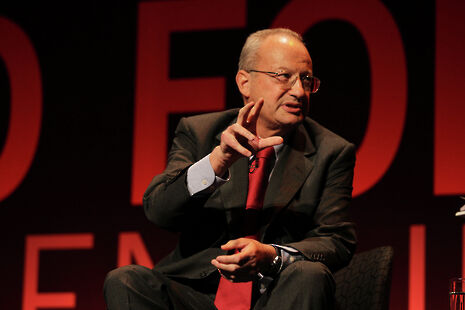A how-to guide to being a University Chancellor
Andrew Connell investigates the role of Cambridge’s Chancellor – Lord Sainsbury

How great an impact does a University Chancellor have on the lives of students and staff? Very little, many might say. The election of the Duchess of Cornwall as Chancellor of Aberdeen University last week will cause many to ask themselves what the rhetoric behind the role of an ‘ambassador’ or a ‘champion’ for a university actually means in real terms.
The election for the position at the University of Cambridge in 2011 pitted the incumbent Lord Sainsbury against a variety of figures: the actor Brian Blessed, shop owner Abdul Arain and barrister Michael Mansfield QC. Billed by Varsity as the ‘clash of the greengrocers’, it would be fair to say that there was great excitement (and even some humour) surrounding the elections, along with national press attention on the candidates’ individual pledges as to how they would approach the role.
It’s hardly surprising that the Chancellors of universities across the UK are occupied by a colourful range of people from all walks of life. Pakistani politician and former cricketer, Imran Khan, is Chancellor for the University of Bradford. Sir Patrick Stewart, better known as Captain Jean-Luc Picard, is the University of Huddersfield’s equivalent, while the former leader of the Liberal Democrats, Sir Menzies Campbell, fills the role at the University of St. Andrews. The relevance of this enigmatic figure requires an exploration of what the role of Chancellor entails in basic terms.
The truth is that this role is largely titular and symbolic. The normal profile of a Chancellor stipulates a distinguished person, who can ‘bat’ for the university’s interests and who can act as an ambassador or representative of the institution, as well as highlighting the teaching, research and other activities of the university.
The role of the Vice Chancellor, by contrast, is more specific: they deal with the day-to-day workings of the university. The Chancellor is, nonetheless, called upon to advise the university on difficult points, and attribute his support to the Vice-Chancellor.
Public engagements at Cambridge include two annual ceremonies which the Chancellor usually attends: the conferment of Honorary Degrees, and the induction of new members of the Guild of Benefactors.
Aside from this, Lord Sainsbury visits Cambridge once or twice a term, visiting faculties, departments, faculties and briefing meetings.
The Chancellor has few perks; he is neither paid nor eligible for expenses, nor is he employed by the University. It is unlikely, though, that Lord Sainsbury, as a supermarket magnate with an estimated wealth of £1.3 billion, would require any such financial assistance.
On his website prior to being elected, Lord Sainsbury wrote: ‘I have a great admiration for Cambridge, which I regard as a major national asset. If I were elected as Chancellor, I would be a passionate champion for Cambridge at home and abroad at a difficult time for universities.’
Since his election, Lord Sainsbury has used his role to highlight activities of importance to the importance of the University, such as the Gates Cambridge, a global scholarship scheme for outstanding overseas applicants seeking to study for a postgraduate degree at the university. He characterises his role as being one which supports and unifies the university, without being involved in policy-making. This position has been endorsed by academic staff, most notably classicist Mary Beard, who in 2011 wrote a piece for the Times Literary Supplement explaining that what drew her to vote for Sainsbury was that unlike any other candidate, “...he correctly sees what the ‘job’ of the chancellor is”. She asserted that this “...should be an enabling role, not a politically directive one”.
The election for a new Chancellor of the university was called after the retirement of HRH The Duke of Edinburgh at the end of June 2011, who started to wind down his commitments, coinciding with his 90thbirthday. He had been in the role since 1976, following in the footsteps of Dukes, Lords and Earls who have principally occupied the position as far back as the 16thcentury.
Lord Sainsbury’s candidature as the official nomination by the university’s Nomination Board came as the first contested election in 150 years. Lord Sainsbury of Turville received 2893 votes, out of 5558 in total. Upon being elected, he said: “I look forward to championing the University in its entirety at home and abroad in the years ahead.”
Although not a very visible presence, the Chancellor of any university assumes a role that cannot be undermined in championing the establishment’s successes, in addition to bolstering the university’s reputation around the globe, through a pledge of loyalty and dedication. The Duchess of Cornwall joins the increasingly female line-up of University Chancellors, which still remains a largely masculine domain and a role still seems restricted to the financially privileged. The search for more relatable or representative figures in society is a welcomed prospect; the difficulty is seeking out those who have sufficient clout within circles of power to get the most for the university that they are championing
 Features / Should I stay or should I go? Cambridge students and alumni reflect on how their memories stay with them15 December 2025
Features / Should I stay or should I go? Cambridge students and alumni reflect on how their memories stay with them15 December 2025 News / Cambridge study finds students learn better with notes than AI13 December 2025
News / Cambridge study finds students learn better with notes than AI13 December 2025 News / Uni Scout and Guide Club affirms trans inclusion 12 December 2025
News / Uni Scout and Guide Club affirms trans inclusion 12 December 2025 Comment / The magic of an eight-week term15 December 2025
Comment / The magic of an eight-week term15 December 2025 News / News In Brief: Michaelmas marriages, monogamous mammals, and messaging manipulation15 December 2025
News / News In Brief: Michaelmas marriages, monogamous mammals, and messaging manipulation15 December 2025








